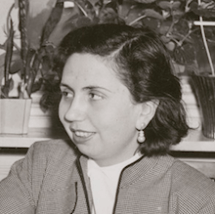Abstract
Rita R. Schorr begins this interview by recounting her childhood in Poland, the outbreak of World War II, and her and her family’s placement in Auschwitz. She explains the trauma of this experience, as well as her determination to survive. Schorr transitions to discuss her education in Munich after she was liberated, and her later move to the United States. She describes the gratitude she feels toward the Pembrokers who fundraised on her behalf, as well as the support she received from friends, professors, and members of the Brown University and Providence Jewish community. She details her graduate experience at Radcliffe and the supportive figures she met while she was there. Schorr concludes the interview by describing her academic career, marriage, her children, her bat mitzvah, and her approach to the world today.
Recorded on July 13, 2014 in Pikesville, MD
Interviewed by Claudia Schechter
Suggested Chicago style citation: Schorr, Rita R.. Interview. By Claudia Schechter. Pembroke Center Oral History Project, Brown University. July 13, 2014.
Biography
Rita R. Schorr was born on April 16, 1934 to a prominent Jewish family in Boryslav, Poland, currently the Ukraine. With the outbreak of World War II, her family experienced the Soviet Occupation and, with the 1941 implementation of the “Final Solution,” the German concentration camps. Liberated from Auschwitz on January 27, 1945, Schorr was forced to rebuild her life without her family. She attended a Hebrew high school in Munich and then, with the financial support of Pembroke College students’ fundraising efforts, was able to come to the United States and attend Pembroke College on scholarship. While at Pembroke, Schorr studied History and International Relations and interned with the U.N. She later did graduate work at Radcliffe College. After this, Schorr married, had a career in teaching, and had two daughters. Her advice to Brown students is: “Put all you can to be the best you can. And contribute the best way you can.”
